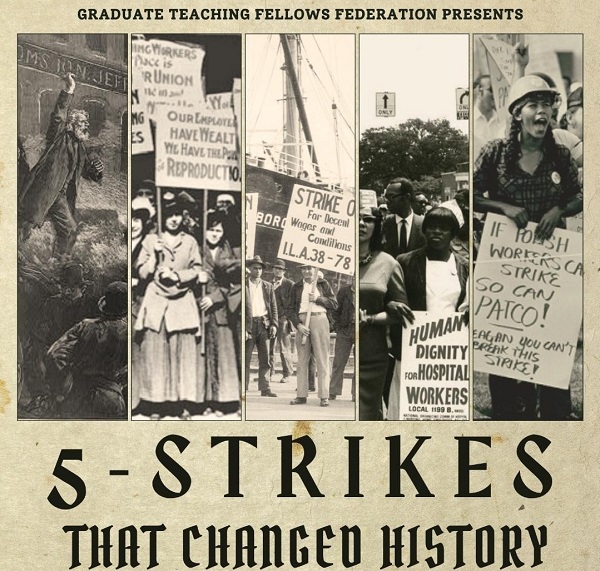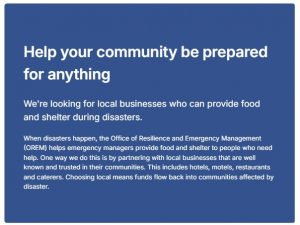Solidarity Coffee: We need more diversity of ideas and perspectives, new union leadership
10 min read
Presenter: As the Bigfoot strike transitions to a new phase, Todd Boyle visits with union organizer Lonnie Douglas, to talk about the future of unions. Saturday morning, April 26, Todd Boyle:
Todd Boyle: So we’re here this morning at Theo’s Coffee, 11 o’clock. What is this the meeting of?
[00:00:17] Lonnie Douglas: Oh, it’s Solidarity Coffee. What it is, is just a place for people to meet so that we’re doing something besides just transactional unionism or transactional activism. You know, the idea is that if we really want to build up our labor movement, we have to get back to, like, the old skill, old-time organizing around social things.
[00:00:38] You know, people aren’t going to show up if it’s just a planning meeting, but if you’re doing coffee or having a barbecue—
[00:00:46] Todd Boyle: People to get to know each other.
[00:00:47] Lonnie Douglas: Exactly, exactly. Build actual relationships that aren’t transactional, that are based on, like, ‘Hey, show up for my action and I’ll show up for yours.’ It’s like, ‘No, I’ll show up for your action because we’re friends and we’ve broken bread together and stuff.’
[00:01:02] Todd Boyle: A lot of things were organized back, you know, in earlier decades, in bars, you know?
[00:01:07] Lonnie Douglas: Yep. my grandma, when I asked her, she said, ‘Oh yeah, you know, people would organize at barn raisings and siftings,’ I think it was. It’s where they would get together and they would sift the wheat or the grain. Apparently that was a thing. I mean, obviously she was like, way back in the day.
[00:01:24] It was social. People got together, because they needed to help each other, but they were also, you know, getting to know each other, you know?
[00:01:32] Todd Boyle: And what I like is it’s a sort of a think tank, a place where people learn to knit together their different things that they understand. Yeah. And it helps to develop a person’s thinking.
[00:01:42] Lonnie Douglas: Yeah. Well, yeah. And you part of what we do with the network is, you know, our core values, obviously solidarity and respect, but diversity is a big deal too. And we’re not just talking like diversity is in race or gender, it’s also diversity of ideas and politics and things like that—bringing together everybody instead of letting the powers that be try to separate us.
[00:02:07] Todd Boyle: So one of the things I wanted to ask you about: A couple weeks ago, there was the town hall from the Bigfoot strike. The issue is they already had a pension plan. Isn’t that it?
[00:02:15] Lonnie Douglas: Well, it’s even more than that. The owners and the lawyers that they’ve hired know that the pension is a red line in the sand for the Teamsters. The whole point that they attacked the pension was so they could force them out on strike—this is what we believe—and basically bust the union.
[00:02:32] So what they’re doing is they’re using the pension as a tool to try to get rid of the union. They did that with the Meletis strike. They did it with the Western strike. They did it with the Coors strike. It goes all the way back to the ’70s with the Coors strike in that industry.
[00:02:45] Todd Boyle: I remember that.
[00:02:46] Lonnie Douglas: Yep. And so the real goal, we believe, is that they want to get rid of that union—get rid of the union at Bigfoot.
[00:02:55] Todd Boyle: I was a Coors drinker, and then I quit during that strike, never went back.
[00:02:59] Lonnie Douglas: Yep. One of our board members, Tizoc (Arenas), his mentor worked on that strike and he’s done a lot of work to preserve the history of that strike.
[00:03:09] Todd Boyle: So, let’s take this back a little more. What we’re dealing with is global capitalism and colonialism, and so the labor movement is a movement for the workers to have some semblance of control and ownership of their enterprise.
[00:03:28] Lonnie Douglas: Yeah, I would say we’ve gone even beyond capitalism in America and we’ve gone straight into fascism. Like, the ideas that people had of Main Street capitalism, right, with the small business and fair markets and innovation? Like, that’s all gone out the window. I mean, that doesn’t even exist anymore. (It’s monopoly now.)
[00:03:49] I mean, I grew up liking the idea of small-business capitalism. Maybe that really didn’t exist; it was a romanticized version that they taught us. But that’s what I grew up on. That is not what we have.
[00:04:05] And the idea is, that type of fair market capitalism, that Main Street capitalism doesn’t work without the workers. A lot of these fascists and billionaires will be, like, ‘Well, I’m the one who puts up the capital. I’m the one putting up the risk.’
[00:04:20] Well, you’re not really putting up any more risk than the worker who, if the company closes down, they lose their job. The worker doesn’t want the company to close down, but they do want a fair wage for their labor. They want to have a decent standard of living, they’re entitled, they earned that. They earned it. With their labor, they earn it.
[00:04:41] And you know, I have no problem with people being rich, but when you’re rich enough to buy countries, like there’s something seriously wrong, especially when the people in the country you’re buying, you’ve got people living on the streets. That tells you, right there, that the system that we have isn’t working. And I think even people on the right and the left all see that.
[00:05:02] Todd Boyle: If you go into any large corporation, the company is run by its workforce, right? It’s run by teams, right? Work teams, and units in the company, and they don’t have to exchange money with each other to figure out how to run their company. So the whole thing is just a complete fraud.
[00:05:15] Lonnie Douglas: Oh, it is. I mean, it used to be they said, ‘Oh, it stimulates innovation.’ They don’t say that anymore. And why? Because you don’t see innovation in, like, these big corporations. They actually crush innovation because that would be a threat to their profits.
[00:05:31] So this idea that like big corporations like Amazon or Comcast, Verizon—they don’t want innovation, they don’t want competition. They want to lock down the markets, get as close to having a monopoly as they can.
[00:05:45] Todd Boyle: Use it as a cash cow. That’s all they want. (Yeah.) And they don’t, how much innovation do we get from the Ma Bell companies, right? None, right? And they’re still out there with the copper lines. It’s so ridiculous that we still have CenturyLink and the other remnants of the Bell Telephone System with no innovation. Yeah. At all.
[00:06:01] Lonnie Douglas: In a fascist country, which is what we are now, we’re not even a capitalist country, you don’t want innovation. You want control. And the other thing is, like, if you go to a store, like just go to The Dollar Tree, and they have one register going at any given time and the company won’t do two registers because they don’t care about the customers.
Because the idea of ‘the customer is always right,’ that’s not real anymore. They know that those customers are probably poor people and they’re locked in. If you lock in the customers and they have nowhere else to go, then you can treat them as crappy as you want. So anytime you’re standing in a line or you get bad service at a McDonald’s or Burger King (or Walmart).
[00:06:45] Yeah. Or Walmart and Target. It’s probably because they are short-staffed, and they’re short staffing intentionally. They’re not providing the workers with the resources they need to do the job. And they’re treating ’em like, they, they intentionally treat them badly.
[00:07:02] Alan Greenspan was the head of the (Reserve) Federal Reserve. And back in the ‘80s he wrote a paper. I remember reading this and there was a paragraph in the paper where he talked about ‘worker insecurity.’
And he basically said that the idea is that companies and corporations need to keep their workers in a state of constant fear and insecurity.
[00:07:24] He said if they do that, it’s really good for business because they’re less likely to form unions. They’re less likely to ask for wages. They don’t quit. Yep, because they’re, they’re afraid.
[00:07:35] He said, however, he also said in the next paragraph, that’s good for business, but it’s not a sustainable economic model. Even he recognized that if you treat workers bad enough, you can’t sustain that. And he’s like an evil dude. Like he is a horrible, horrible person.
[00:07:54] Todd Boyle: But I want to go back to: What’s the state of unions in the private sector? Is there any hope?
[00:08:00] Lonnie Douglas: I think there is. The problem we have is that we have this business unionism, right? It’s like, it’s basically they all run like corporations, top-down. The workers, the union members don’t really have a lot of say, often, and I know that’s very critical and a lot of people say you shouldn’t be critical of the labor movement.
[00:08:17] But I’m like, ‘We have to be critical of our leadership.’ There’s a reason that we’re at 86% of Americans are favorable toward unions, would like a union, but we have less than 10% union membership. And so that’s a failure of leadership.
[00:08:30] So I think the hope comes, and this is the sad thing, is we reached a point where this new generation coming up, right, the kids that are like 16, 17, 18 years old now are entering a business, entering a system where there is no longer an eight-hour workday or a 40-hour work week. They’re getting rid of child labor laws.
[00:08:51] They’re getting rid of, you don’t get vacations, you don’t get health care, you don’t get all these things that my grandparents had, my parents, our parents had. My generation started losing those. So they have none of that. They’re basically back where they were in the 1800s, and so they’re going to have no choice but to start up their own labor movement.
[00:09:13] They’re going to have a challenge ’cause of the surveillance state stuff is way harder than it was in the 1900s. But I think that they’re not going to have a choice. And I think we’ll see a resurgence.
[00:09:23] Todd Boyle: Will we see an increased consciousness among labor?
[00:09:28] Lonnie Douglas: We can. So a good example is this Bigfoot strike. We brought together an initial coalition. Our network basically got five groups together: The Lane County Labor Chapter, which is under the AFL-CIO; the Democratic Socialists of America; the Revolutionary Women’s Committee, the Revolutionary Study Group; and ESSN (Eugene Springfield Solidarity Network). Well.
[00:09:51] The AFL-CIO is very hesitant. Like, they’re still kind of locked and some of them are locked in these old-school ideas of, like, you know, ‘Socialism bad,’ and they’re fearful of it ’cause they do a lot of politics.
[00:10:06] But getting them in the room with the Democratic Socialists and like the Revolutionary Women’s Committee, which is like they’re straight-up communists, but they were all working together. And the AFL and them, they see the value in doing this work, working with DSA and these other groups, they may not politically see eye-to-eye on everything.
[00:10:27] You know, just like me, I’m a conservative, but I work with a lot of socialists and communists and anarchists and everybody because we’re all working on the same things. That’s what we need though. We’re all siloed in these little groups and nobody interacts with each other.
[00:10:44] So we’re, everybody’s fearful of each other. But the minute you get them working on something together, like, that starts to go out the window. I mean, if a person’s standing next to you and they’re willing to take a punch for you, it doesn’t matter what their politics is, you know? That person’s going to become your friend.
[00:11:02] You may not agree with everything that they agree with, but, I mean, your families don’t agree with everything…
[00:11:10] When I was in the Coast Guard, you know, we always talked about diversity, and that was before all the woke stuff. This was back in the ’80s and the early ’90s. But what we were talking about was, we want a diversity of ideas.
[00:11:23] And you get that, not just by getting different people of color or people from different countries or people with different genders and things like that, but I mean, you just get it from having people with different ideological leanings, and there’s nothing wrong with having that diversity.
[00:11:41] If we could convince our fellow workers and neighbors that spend all their money and all their time on political campaigns to organize within their communities on things that matter in their community, instead of trying to get somebody elected president, our world would be much better.
[00:12:01] Todd Boyle: So when’s the dates and times for these coffees?
[00:12:04] Lonnie Douglas: Every Saturday, 11 a.m. to 1 p.m., so basically same time as the Our Revolution stuff used to be. Yeah. Solidarity Coffee. If you want to come and talk labor issues or activist issues or whatever, or find out what’s going on with the network, you can do that. Or you can go to SolidarityNetwork.org and look at our calendar.
[00:12:20] Todd Boyle: Hey, thanks for the chat.
[00:12:21] Lonnie Douglas: All right, brother. Thanks.
[00:12:23] Presenter: With the Bigfoot strike ending and moving into a new phase, Todd Boyle and Lonnie Douglas meet at Solidarity Coffee. They discuss the future of unions, the need for new union leadership, and an important type of diversity, a diversity of ideas and perspectives.
Field recordings by Todd Boyle produced by John Q for Whole Community News on KEPW, 97.3, Eugene’s PeaceWorks community radio.




